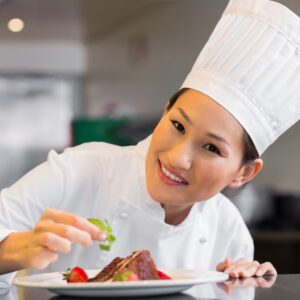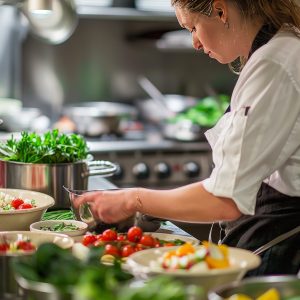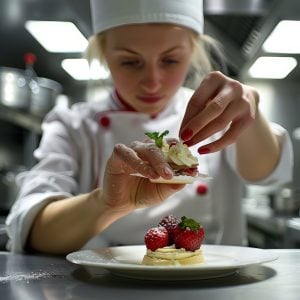Should You Go to Culinary School to Become a Food Critic?
Becoming a food critic is a dream job for many culinary enthusiasts. It combines a passion for food with the art of storytelling. As a food critic, you can explore diverse cuisines, experience chefs’ creativity, and share your insights with a broad audience. Becoming a respected food critic requires a blend of culinary knowledge, writing skills, and a discerning palate.
Being a food critic is more than just about tasting food. It’s about having a discerning palate that can decipher flavor nuances, presentation, and dining experience. A proficient food critic can vividly describe the subtleties of a dish, from its texture and aroma to the balance of its ingredients. They also provide context, often linking to cultural traditions and culinary history.
Building credibility is critical in this field. This means having a deep appreciation and understanding of food and being able to offer fair, unbiased critiques. Networking with industry professionals, continually expanding your culinary horizons, and honing your writing style are essential. Whether you’re reviewing a high-end restaurant or a hidden gem, your reviews should be informative, engaging, and reflective of your unique voice and perspective.
Skills Needed to Be a Food Critic
To become a successful food critic, one needs to cultivate diverse skills encompassing culinary knowledge, writing proficiency, and interpersonal abilities. Here are the key skills required:
Culinary Knowledge
- Palate Development:
- Ability to discern and describe subtle flavors, textures, and aromas.
- Understanding of various cooking techniques and ingredients.
- Food and Beverage Pairing:
- Knowledge of how different beverages complement various dishes.
- Understanding of wine, beer, and cocktail pairings with food.
- Culinary Trends:
- Keeping up-to-date with the latest food trends and dining concepts.
- Understanding the history and cultural significance of different cuisines.
Writing and Communication
- Writing Skills:
- Ability to write clear, engaging, and descriptive reviews.
- Strong command of grammar, punctuation, and style.
- Storytelling:
- I am crafting compelling narratives that capture the essence of the dining experience.
- Balancing informative content with personal anecdotes and insights.
- Critical Thinking:
- Evaluating and articulating the strengths and weaknesses of a dish or restaurant.
- Offering constructive feedback that is fair and unbiased.
Interpersonal and Professional Skills
- Networking:
- Building relationships with chefs, restaurateurs, and industry professionals.
- Attending food events, tastings, and industry gatherings to stay connected.
- Professionalism:
- Maintaining objectivity and integrity in reviews.
- Respecting confidentiality and avoiding conflicts of interest.
- Adaptability:
- Being open to trying new foods and dining experiences.
- Adapting writing style and approach to different media types (e.g., print, online, social media).
Research and Analysis
- Research Skills:
- Investigating the background of a restaurant, its chefs, and its menu.
- Understanding the local food scene and its key players.
- Analytical Skills:
- Comparing dining experiences and drawing meaningful conclusions.
- Identifying trends and patterns in the culinary world.
Photography and Social Media
- Photography:
- Taking appealing photos of food to complement reviews.
- Understanding basic principles of food photography, such as lighting and composition.
- Social Media Savvy:
- Using social media platforms to share reviews and engage with followers.
- Building a personal brand and following in the food critique community.
By developing these skills, aspiring food critics can effectively convey their dining experiences, build credibility, and influence the culinary landscape through their reviews.
Finding the Right Job
Getting a job as a food critic involves building relevant skills, gaining experience, and networking within the culinary and media industries. Here’s a step-by-step guide on how to pursue this career:
1. Develop Your Culinary Knowledge
- Education: To deepen your understanding of food and cooking techniques, consider taking courses in culinary arts, food science, or hospitality management.
- Self-study: Read extensively about different cuisines, culinary trends, and restaurant reviews. Watch cooking shows and follow renowned chefs and critics.
2. Hone Your Writing Skills
- Writing Practice: Regularly practice writing descriptive and engaging content about food. Start a blog or contribute to online food forums.
- Courses: Take writing courses, especially those focused on food writing or journalism. Workshops and seminars can also be valuable.
3. Gain Relevant Experience
- Start a Blog: Create a food blog to showcase your reviews and writing style. This will help you build a portfolio and online presence.
- Freelance: Write for local newspapers, magazines, or online publications. To gain exposure, offer to review restaurants for free or for a small fee.
- Social Media: Use platforms like Instagram, Twitter, and Facebook to share your reviews, engage with followers, and connect with other food enthusiasts.
4. Network with Industry Professionals
- Attend Events: Go to food festivals, restaurant openings, and culinary events to meet chefs, restaurateurs, and fellow food writers.
- Join Associations: Become a food writing or journalism association member to access resources and connect with professionals in the field.
- Mentorship: Seek mentorship from established food critics or journalists who can provide guidance and introductions.
5. Build a Portfolio
- Collect Samples: Compile your best reviews and articles into a professional portfolio. Include a variety of writing samples to demonstrate your range and expertise.
- Showcase Photography: If you have photography skills, include high-quality photos of food to complement your written work.
6. Apply for Jobs
- Research Publications: Identify magazines, newspapers, websites, and other media outlets that publish restaurant reviews and food content.
- Tailor Applications: Customize your resume and cover letter for each application, highlighting your culinary knowledge, writing experience, and any relevant coursework or certifications.
- Leverage Contacts: Use your network to learn about job openings and get referrals. Personal recommendations can be efficient.
7. Continue Learning and Improving
- Stay Updated: Follow influential food critics and subscribe to food publications to stay informed about the latest culinary trends, restaurant openings, and industry news.
- Seek Feedback: Regularly seek feedback on your writing and use it to improve. Attend writing workshops and critique groups.
8. Be Persistent
- Resilience: Breaking into the field of food criticism can be challenging, so stay persistent and keep refining your craft.
- Adaptability: Be open to various writing opportunities within the food and hospitality industry, such as food blogging, recipe development, and content creation for culinary brands.
By following these steps, you can build the skills, experience, and connections needed to pursue a career as a food critic.












